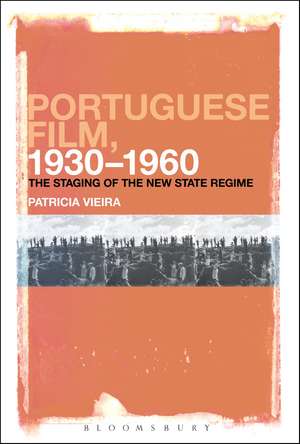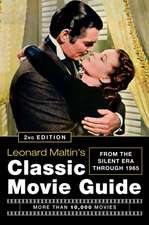Portuguese Film, 1930-1960: The Staging of the New State Regime
Autor Dr. Patricia Vieiraen Limba Engleză Hardback – 9 oct 2013
| Toate formatele și edițiile | Preț | Express |
|---|---|---|
| Paperback (1) | 257.59 lei 6-8 săpt. | |
| Bloomsbury Publishing – 22 apr 2015 | 257.59 lei 6-8 săpt. | |
| Hardback (1) | 830.62 lei 6-8 săpt. | |
| Bloomsbury Publishing – 9 oct 2013 | 830.62 lei 6-8 săpt. |
Preț: 830.62 lei
Preț vechi: 1064.88 lei
-22% Nou
Puncte Express: 1246
Preț estimativ în valută:
158.99€ • 172.76$ • 133.64£
158.99€ • 172.76$ • 133.64£
Carte tipărită la comandă
Livrare economică 21 aprilie-05 mai
Preluare comenzi: 021 569.72.76
Specificații
ISBN-13: 9781623568634
ISBN-10: 1623568633
Pagini: 272
Ilustrații: 20
Dimensiuni: 152 x 229 x 23 mm
Greutate: 0.43 kg
Editura: Bloomsbury Publishing
Colecția Bloomsbury Academic
Locul publicării:New York, United States
ISBN-10: 1623568633
Pagini: 272
Ilustrații: 20
Dimensiuni: 152 x 229 x 23 mm
Greutate: 0.43 kg
Editura: Bloomsbury Publishing
Colecția Bloomsbury Academic
Locul publicării:New York, United States
Caracteristici
Provides critical and in-depth analysis into cinema history of the Portuguese totalitarian state (1930-1960)
Notă biografică
Patricia Vieira is Assistant Professor in the Department of Spanish and Portuguese, in the Comparative Literature Program, and in the Film and Media Studies Program of Georgetown University, Washington, USA.
Cuprins
AcknowledgementsIntroduction: Cinema in the New State 1. Propaganda in the New State: The May Revolution (A Revolução de Maio)1.1. Propaganda in Portuguese Cinema1.2. Salazar's Truth as Ideology1.3. The Primacy of Art: António Ferro's Politics of the Spirit1.4. The Staging of the Leader2. Poets on the Silver Screen: Bocage, Camões, and the Heroes of the Regime2.1. Literature and Film in the Politics of the Spirit2.2. The Heroes of the New State2.3. Against Political Inconstancy: The Hero as a Serious Man3. Rural Life in Cinema: In Defense of a Natural Society2.1. Regional and Folkloric Films2.2. A Natural Cinema2.3. The Countryside and the City2.4. Capitalism, Communism, Corporatism4. The Miracle of Salazarism: Fátima, Land of Faith (Fátima, Terra de Fé)4.1. Fátima in the New State4.2. Reason, Faith and Politics in Film4.3. Balancing Reason and Religion4.4. Beyond Reason and Faith: The Danger of Nihilism5. Gender Stereotypes in New State Cinema5.1. Women in New State Films5.2. Singing as a Transgression5.3. Fado, Fatalism and the Portuguese Femme Fatale6. The Empire as Fetish: Spell of the Empire (Feitiço do Império)6.1. Portugal and its Colonies6.2. The Magic of Africa6.3. The Empire as a Fetish 6.4. Spell of the Empire and Colonial Propaganda7. The Spirit of the Empire in Chaimite7.1. Spirituality and Materiality in Salazarism7.2. The Spirit of Portuguese Colonization7.3. The Politics of the Spirit in ChaimiteEpilogue: New State Cinema TodayBibliographyIndex
Recenzii
This book is a major achievement, but it is difficult. Most readers will be intimidated: they will not know the films; the films are not very good ('too heavily invested in disseminating the values of the regime'); and few readers have the history of Portugal at their fingertips. Vieira (Georgetown) puts Salazar in the Mussolini/Hitler category. Hideous aspects of cruel tyranny mark every regime-approved film. Salazar, the ruler of Portugal's so-called New State, wanted to combat lies, error, slander, and ignorance. See the film A Revolução de Maio, or The May Revolution (1937). He believed that good rural life, agriculture, is humanity's call (A Canção de Terra, or The Song from the Earth, 1938). Virtuous women (i.e., women obedient to men) are the foundation of society. The Portuguese are spiritual (Fátima Terra de Fé, Fatima, Land of Faith, 1943). What about colonies?They are necessary, democratic, and Christian (Feitiço do Império, Spell of Empire, 1940). Colonizing is spiritual, protective, civilizing (Chaimite, 1953). The best supplement to this intensity study is not a history of Portuguese movies, but a consideration of propaganda, like Toby Clark's Art and Propaganda in the Twentieth Century: The Political Image in the Age of Mass Culture (1997). Summing Up: Highly recommended. Graduate students, researchers, faculty.--
With an interesting sociological approach, Vieira intelligently applies the works of Kracauer, Freud and Weber to the study of a basic, yet relatively unknown, aspect of Salazar's regime: propaganda ... A concise and well-researched text.
This extremely well-researched book gives the reader, for the first time, a thorough understanding of how the ideology of the New State pervaded, in varying degrees, three decades of Portuguese film production. Patricia Vieira deserves applause for the rigour and balance of her approach, but also for her unflinching commitment to a political cause.
This meticulously-researched and well-written book represents a major contribution to Portuguese film historiography. Drawing from a broad range of official documents, critical reviews, and a diverse array of films - ranging from comedy and folkloric films to overt propaganda - it offers a theoretically sophisticated, in-depth analysis of the relationship between cinema and the fascist New State in the period between 1930 and 1960 as well as a model for the discussion of film and politics.
Salazar's New State and his nationalistic and imperialistic 'Portuguese-style fascism' figure heavily in Portuguese cinema from the 1930s to the 1950s. In her fascinating book, Vieira brings this staging into sharper focus and provides us with a valuable new contribution to the field.
With an interesting sociological approach, Vieira intelligently applies the works of Kracauer, Freud and Weber to the study of a basic, yet relatively unknown, aspect of Salazar's regime: propaganda ... A concise and well-researched text.
This extremely well-researched book gives the reader, for the first time, a thorough understanding of how the ideology of the New State pervaded, in varying degrees, three decades of Portuguese film production. Patricia Vieira deserves applause for the rigour and balance of her approach, but also for her unflinching commitment to a political cause.
This meticulously-researched and well-written book represents a major contribution to Portuguese film historiography. Drawing from a broad range of official documents, critical reviews, and a diverse array of films - ranging from comedy and folkloric films to overt propaganda - it offers a theoretically sophisticated, in-depth analysis of the relationship between cinema and the fascist New State in the period between 1930 and 1960 as well as a model for the discussion of film and politics.
Salazar's New State and his nationalistic and imperialistic 'Portuguese-style fascism' figure heavily in Portuguese cinema from the 1930s to the 1950s. In her fascinating book, Vieira brings this staging into sharper focus and provides us with a valuable new contribution to the field.













